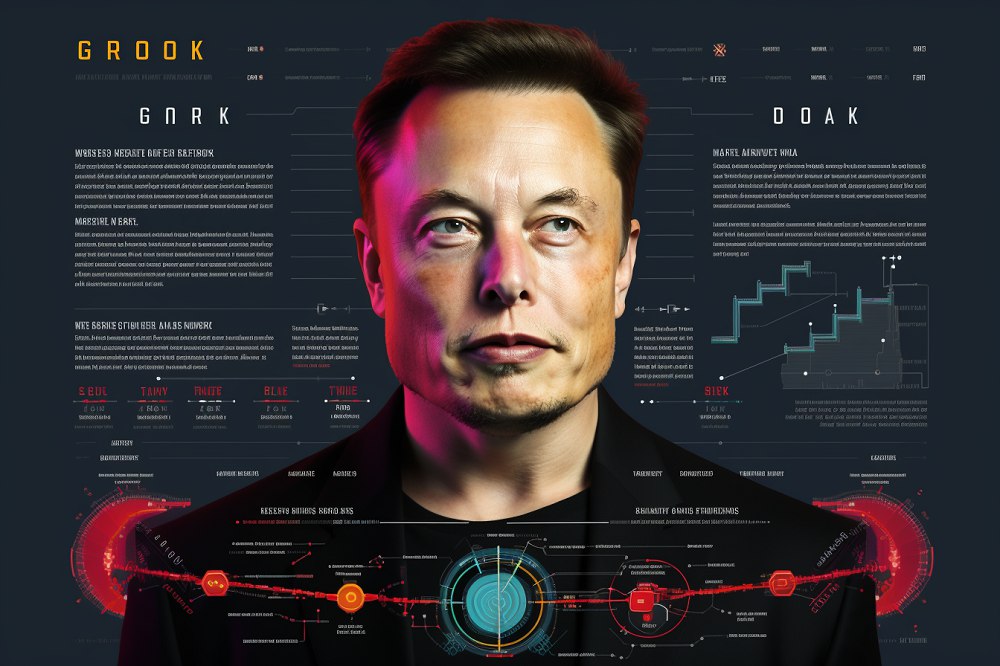Elon Musk, known for spearheading Tesla, Neuralink, and SpaceX, recently delved into artificial intelligence with Grok. This AI chatbot, crafted by xAI, Musk’s research and development firm, aims to entertain, inform, and captivate users with its wit.
Exploring Grok’s Mechanism
Grok, the freshest face in the expansive Language Model (LLM) domain, blends NLP and deep learning. An insight into how Grok operates sheds light on its inner workings.
Grok combines natural language processing (NLP) and deep learning techniques, enabling it to understand human language and adapt over time. Fueling Grok’s functionality is a vast dataset encompassing various text and code, including real-time data from X.
This rich knowledge base empowers Grok to comprehend and stay updated on different subjects and current events.
Grok’s Distinction From Competitors
In several ways, Grok stands out distinctly from its competitors, such as Google’s Bard and OpenAI’s ChatGPT. One key aspect is Grok’s engaging and personable personality, designed with sarcasm and wit, mirroring Elon Musk’s persona.
Another distinguishing factor lies in Grok’s access to real-time information from X, enabling it to provide more immediate and relevant responses than its counterparts. Additionally, Grok’s ongoing development ensures its continuous evolution and improvement, setting it on a dynamic path within the AI landscape.
Grok’s Performance Analysis
Evaluation results place Grok-1 at par with established models and ahead of them in some cases:
Grok-1 impresses with a C in a Hungarian math exam, close to GPT -4’s B grade. Also, Grok-1 scores notably in the human evaluation and multitasking language understanding benchmarks, surpassing GPT-3.5.
These evaluations gauge AI models’ capabilities across programming challenges and diverse language tasks.
The Nitty-Gritty Of Grok AI
Grok’s architecture leverages transformer algorithms, revolutionizing NLP by handling lengthy text sequences and intricate word relationships to facilitate coherent responses.
Transformers
Transformers are the brain behind Grok’s comprehension power. They allow Grok to process and interpret lengthy conversations, decipher complex linguistic nuances, and generate responses that mimic natural human speech patterns.
These transformers break down complicated sentences, grasping the relationships between various words. This ability helps Grok decipher context, leading to more accurate and contextually relevant responses.
Web Algorithm
Underneath its sleek interface lies an intricate web of algorithms that process every query and craft responses. These algorithms analyze patterns, anticipate user needs, and generate appropriate replies in a seamless conversational flow.
Grok’s algorithms bridge the gap between human language and machine learning, striving to make conversations more intuitive and engaging for users.
Adaptability
Grok’s learning isn’t static; it continuously adapts. This adaptability allows this AI tool to grow more intelligent, learning from each interaction and refining its responses for future engagements.
With every chat, Grok fine-tunes its understanding of language nuances, user preferences, and the context of conversations, striving for improved accuracy and relevance in its responses.
Grok’s Liberality And Functionality
Grok’s liberality and functionality are two key aspects defining its approach. The liberal NSFW filters allow a broader range of topics than other AI systems without sacrificing ethical conversations.
Thus, users can discuss more subjects while maintaining responsible AI interaction. Meanwhile, Grok’s functionality extends beyond just answering questions.
It can generate diverse text formats, like poems, code, or even musical pieces. Its ability to engage in conversations that adapt to the user’s context and preferences sets it apart, making interactions more engaging and tailored to individual users.
Grok’s Strengths And Limitations
Grok boasts strengths and areas where it faces limitations in its capabilities. Its forte lies in its ability to offer comprehensive answers to various questions, covering factual queries or engaging in open discussions.
However, limitations persist within Grok’s functionalities. Like many conversational AI systems, it might exhibit biases based on the data it has been trained on.
There’s also the potential for misinterpretation of user intent or context, leading to inaccurate or irrelevant responses. Moreover, discerning between factual and false information might pose a challenge, requiring users to exercise caution while interacting.
Grok AI’s Roadmap
Grok AI’s roadmap outlines a strategic plan for its development and growth. Continuous improvement remains a core focus, aiming to refine algorithms, enhance accuracy and relevance, and foster creativity.
There are plans to encompass new tasks such as summarizing complex topics or facilitating language translations. Cross-platform integration is another pivotal step to ensure Grok’s accessibility to a broader user base, enhancing its reach and impact in the conversational AI landscape.
Grok’s Ascent And Challenges
Grok’s journey towards prominence comes with successes and hurdles. Building a loyal user base remains a crucial milestone, necessitating consistent delivery of valuable and engaging user experiences.
Nevertheless, overcoming biases, refining interpretations, and ensuring fact-checking accuracy are essential to fostering user trust and confidence in Grok. Grok must continually introduce new features and enhancements to stay ahead in the competitive AI landscape.
Future Prospects
Elon Musk’s Grok AI chatbot signifies a leap in AI companionship. Grok’s informative, conversational, and personable traits may redefine AI’s role in human interactions as it evolves.
